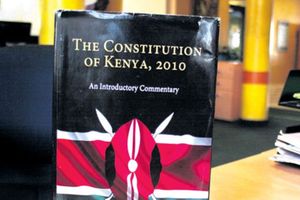
Some of the portraits of those killed in the Mai Mahiu tragedy, displayed during a mass service attended by Deputy President Rigathi Gachagua and other leaders in Mai Mahiu.
Human life happens at the edge of the precipice; there is always something coming after us. I have read somewhere that our culture plays out in the shadow of something more important than itself; that we think and create in spite of the dangers we face.
In 1348-49, the Plague [Black Death] killed half of the Europeans. In 536 AD, volcanic eruptions blanketed our planet with ash, plunging the whole world into darkness for two years, bringing Homo sapiens, after 300,000 years, to the very door of extinction.
Human existence is precarious; it would only take the smallest of shifts in our planetary surroundings for all trace of humanity to be incinerated, leaving a void, as if we never existed. We must always hope that, somewhere in the inky blackness of Space, there is a God keeping an eye on things!
Our saving grace as a species is our mind—the fact that our imagination is capable of travelling to the very edges of infinity. I saw a social media post the other day publishing the results of a global IQ survey which reported shockingly low scores for Sub-Saharan Africa. The average score in Kenya is 70, slightly higher than South Africa, which is in the high 60s. That means that we are, technically, imbeciles.
Now, you will argue that the survey is racist and inaccurate and I will not argue with you. But our elite, the best amongst us, have no philosophical or moral content; their imaginations are captured and contained by the finite. Isn’t a person who diverts resources from investment in human progress to buy shoes, belts and watches an imbecile?
Piracy
What about if the ‘smartest’ amongst us are brigands who make money not from Bitcoin or the manufacture of semiconductors but piracy, a 16th Century type of crime? What does it make the rest of us? I’d say, just hold on before you condemn the survey. The African mind is stuck in subsistence pursuits: Food, body coverings, shelter and sex.
So, back to subsistence, the rains have buggered the beans. In Makandune, it doesn’t quite rain like normal places, where there is a spatter of annoying drops beating ceaselessly. In Makandune, God tips the bucket and pours it out all at once.
So the rain, when it comes, sweeps everything in its path; it cleans off the crops and cuts trenches in the soil. Good, organic manure which has been trucked halfway across the country is carried away.
But the real terror of this freaky weather season is from the water, and this has nothing to do with a few leaks in basements or silly drainage being overwhelmed and bringing storm water to front yards. It is in water storage: 20 million litres piled high and held back by earth walls.
Water is absolutely the wrong substance to be mucking about with. The force at the front of a high column of water, its ability to penetrate, infiltrate, dissolve and circumvent obstacles, makes it a nightmare to store in large volumes.
Water storage
The government sent the chief and assistant chief to inspect our water storage, in light of what happened in Mai Mahiu, which is a good precaution. But as the planet warms, the real question is: How are we going to hang on to the water we have on earth? There is 332 cubic miles of water on earth, I have read somewhere.
Water doesn’t come from here; it is alien, delivered to our planet by extraterrestrial vehicles—comets and asteroids. I have read some theories about it forming from cosmic winds in the early solar system and—whatever man—it doesn’t come from here, we don’t have capacity to make it beyond a few drops in the land and there will be no life without it.
How do we preserve this mysterious, alien, life-giving substance? This, and the broader changes brought on by a heating planet, is the extinction level threat, the precipice of our age. The solution will not come from some Father Christmas somewhere (there is no Father Christmas; they have to come here).
Playing off tribes against one another, and corruption, might not rise to the level of a solution. The most dangerous thing is a democracy of ignorant people; the kind who pick a leader because he has given them handouts, or claims to be an ignorant villager or struggling trader like them.
Leaders must be teachers, as they used to be, teaching the people the reality of their situation and finding solutions to the big issues of the day—showing their followers the precipice and how to transcend it.
* * *
I think the possibility of President William Ruto addressing a joint session of Congress is being hyped. Please write good speeches for him, maybe about trade or security, none of that stuff about inviting humanity back home.
And script every session, briefly and clearly expressing what you want and what you are offering (not phantom jobs or corrupt deals, if you can help it). And no small talk or blankly staring into space.
Whole thing is a bloody waste of time, of course, but it gives a whole lot of guys a chance to wear their new clothes.
Mr Mathiu, a media consultant at Steward-Africa, is a former Editor-in-Chief of Nation Media Group. [email protected].













